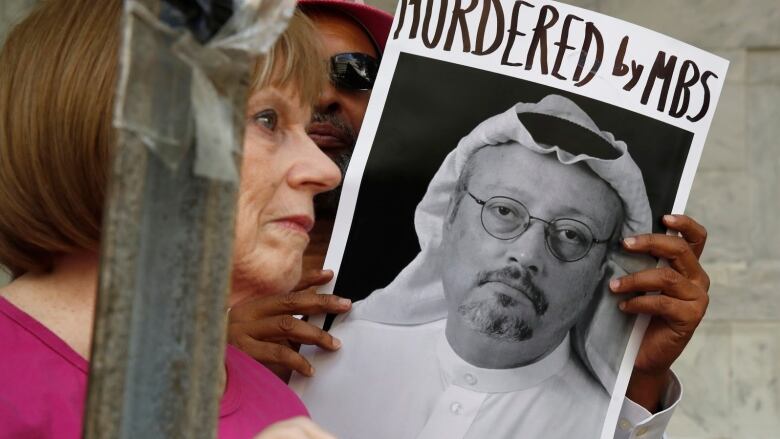Why Jamal Khashoggi's death is as much about the message as the man
More than 40 journalists have been killed this year, but none has received as much attention as Khashoggi

Unless you closely follow politics in the Middle Eastand Saudi Arabia in particularthere's a good chance you had never heard of Jamal Khashoggi until recently. That the writer had nearly two million Twitter followers and was described by Britain's Spectator newspaper as "the most famous political pundit in the Arab world" didn't mean his work was widely known elsewhere.
Nowthe former Saudi journalist, who was living in exile in the United States, has become a household name posthumously,less for his work than for the gruesome way he is believed to have died at the hands of Saudi operatives.
"I think something about the detailsthe men who are said to have flown in and out, the forensic doctor who's said to have brought a bone saw [has led to the notoriety]," said Anne Applebaum, a columnist for the Washington Post, where Khashoggi's work was also often published.
Khashoggi went into the Saudi consulate in Istanbul on Oct. 2 to obtain a documentand hasn't been seen since. After a number of denials, Saudi officials admitted late Friday that Khashoggi died inside the diplomatic mission after a fight.
A number of media reports, many quoting local Turkish police sources, have said Khashoggiwas tortured and dismembered, because the Saudi government was angered by what he'd written in recent years.
"We still need to wait to see whether some of these things are confirmed, but it shows exactly how brazen the Saudi government was, how little they care about public opinion and how interested they were frightening people," Applebaum told CBC's The Investigatorsearlier this week.
Anne Applebaum explains howtheglobal reach of journalists online is putting them increasingly in conflict with the people they are trying to hold to account:
More than 40 journalists around the world have been killed this year for reasons believed to be connected to their work.
Ina recent columnin the Washington Post,Applebaumasserts the deaths of reporters, especially investigative journalists, will continue in large part because more people than ever can see a journalist's work, giving those they hold to account more reason than ever to want them silenced.
Going online offers global reach
While Khashoggi wasn't an investigative reporter, his criticismof the Saudi government under Crown Prince Mohammed bin Salman had intensified in recent years,clearly infuriatingthe regime.
Fearing for his safety, Khashoggi left Saudi Arabia for self-imposed exile in the United States just over a year ago. There, he began writing on the same themes for the Post.
"Someone like Khashoggi five years ago, 10 years ago wouldn't have been a big problem for the Saudi government. He would have been sent into exile, he would have written his articles, people in Washington would have read them, it wouldn't have mattered."
Butnow, she points out, something written for publication in Washington can be read on a smartphone in Riyadh minutes later, and shared with potentially millions of others on social media.
"Journalists have a much wider reach, a much wider ability to penetrate into authoritarian societies than they did a couple of decades ago," she said.

As the reach of journalists' work meant to expose corruption has expanded, so too has the corruption itself,Applebaumargues.
"The offshore banking world is bigger than it ever was: something like maybe up to 10 per cent of the world's wealth is now hidden in offshore bank accounts," she said."People have things to hide, journalists are looking for ways to expose them, and it's becoming more and more dangerous."
Alongside the questions about what really happened to Khashoggi, some have wondered why the Saudi regime would be willing to court the diplomatic damage ofcarrying outan alleged murder on foreign soil, of a journalist who, to many, was unknown.
It may have been less about the manthan the message, Applebaum suggests.
"If you kill one journalist, then you frighten a whole lot of others," she said. "We need to start talking about what democracies can do to protect journalists, because the reach of authoritarians and their interest in silencing people is really greater than it ever was."
Also this week on The Investigators: ProPublica reporter Finlay Young shares why he believes journalists didn't give enough scrutiny to an American charity operating in Liberia,andCBC producer Harvey Cashore explains why his look at the lack of seatbelts in Canadian school buses didn't include comment from the federal minister in charge of that file.Watch The Investigators with Diana Swain, Thursdays at 7p.m.on CBC-Television; Saturdays at 9:30 p.m. ET and Sundays at 5:30 p.m. ET on CBC News Network.













_(720p).jpg)


 OFFICIAL HD MUSIC VIDEO.jpg)
.jpg)



























































































